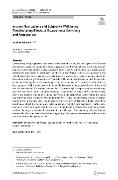Income Fluctuations and Subjective Well-being: The Mediating Effects of Occupational Switching and Remittances

Datum vydání
2024Publikováno v
Journal of Happiness StudiesRočník / Číslo vydání
25 (8)ISBN / ISSN
ISSN: 1389-4978ISBN / ISSN
eISSN: 1573-7780Informace o financování
MSM//LX22NPO5101
MSM//SVV260696
MSM//SVV260611
EU//870245
UK/GAUK/GAUK207923
UK/COOP/COOP
Metadata
Zobrazit celý záznamTato publikace má vydavatelskou verzi s DOI 10.1007/s10902-024-00814-y
Abstrakt
Does money bring happiness? To answer this question, I study the consequences of income fluctuations caused by commodity price changes on well-being patterns in regions specializing in export agriculture. Using nationally representative survey data in a difference-in-differences framework, I investigate the effects of the 2010/11 short-term increase in the global price of cotton. I demonstrate that it can be viewed as a positive income shock for the cotton-producing communities of Tajikistan. The main results indicate that the net subjective well-being effects of the cotton price increase are negative: exposure to the shock at the aggregate level is associated with a notable decrease in the reported levels of financial and life satisfaction. To explain this paradox, I consider split sample analyses, which suggest that the shock led to within-community occupational sorting and that its well-being effects are negative among households that were in the agriculture sector before the shock and barely positive for newly become farmers. Observing the increasing volume of remittances in the world and their significance to the economy of Tajikistan, I also study how remittances affect the relationship between income volatility and happiness. Further estimations reveal that family remittances are not significantly affected by and can partially mediate the negative effects of short-term income changes. The mediating effects of remittances only affect financial satisfaction, suggesting that a mere compensation of losses does not fully restore the quality of life.
Klíčová slova
subjective well-being, export shock, household income, occupational choice, remittances
Trvalý odkaz
https://hdl.handle.net/20.500.14178/2830Licence
Licence pro užití plného textu výsledku: Creative Commons Uveďte původ 4.0 International






